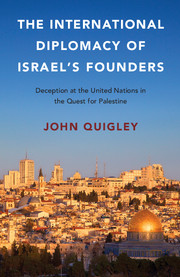 The International Diplomacy of Israel's Founders
The International Diplomacy of Israel's Founders Published online by Cambridge University Press: 05 January 2016
In the wake of the 1967 war, the two issues that saw Eban bobbing and weaving when Israel was being admitted to the United Nations in 1949 rose again to the top of the international agenda. On the issue of Jerusalem and the issue of the Palestine Arab refugees, Israel took its confrontation with the United Nations to a new level. Israel claimed more territory in Jerusalem. It generated thousands of new refugees. On both issues, it would justify its actions by making claims that raised eyebrows.
A DENIAL ON JERUSALEM
In the 1967 war, the Israel Defense Force was able to accomplish an aim that had eluded it in 1948 when it took the old city and eastern sectors of the city of Jerusalem. Israel's capture of those sectors immediately raised concern that it would consider its tenure there permanent and that if it did, the chances for peace would recede even further. As the General Assembly's emergency special session opened, a speech was given in which that concern was pointedly stated. British Foreign Secretary George Brown attended the session and spoke for Britain. Brown spoke about finding a solution for the war. “I now want to set out certain principles,” Brown began, “which I think should guide us in striving collectively for a lasting settlement. Clearly such principles must derive from the United Nations Charter. Article 2 of the Charter,” Brown reminded his audience, “provides that ‘All members shall refrain in their international relations from the threat or use of force against the territorial integrity or political independence of any state.’”
Then Brown applied these principles to the war just ended. “Here the words ‘territorial integrity’ have a direct bearing on the question of withdrawal, on which much has been said in earlier speeches. I see no two ways about this,” Brown continued. “And I state this very clearly. In my view war should not lead to territorial aggrandizement.” Then Brown came to the situation of Jerusalem. “Reports suggest that one particular point may be of special urgency. This concerns Jerusalem. I call upon the Government of Israel not to take any steps in relation to Jerusalem that would conflict with this principle. I say very solemnly to that Government that, if they purport to annex the Old City or legislate for its annexation, …
To save this book to your Kindle, first ensure no-reply@cambridge.org is added to your Approved Personal Document E-mail List under your Personal Document Settings on the Manage Your Content and Devices page of your Amazon account. Then enter the ‘name’ part of your Kindle email address below. Find out more about saving to your Kindle.
Note you can select to save to either the @free.kindle.com or @kindle.com variations. ‘@free.kindle.com’ emails are free but can only be saved to your device when it is connected to wi-fi. ‘@kindle.com’ emails can be delivered even when you are not connected to wi-fi, but note that service fees apply.
Find out more about the Kindle Personal Document Service.
To save content items to your account, please confirm that you agree to abide by our usage policies. If this is the first time you use this feature, you will be asked to authorise Cambridge Core to connect with your account. Find out more about saving content to Dropbox.
To save content items to your account, please confirm that you agree to abide by our usage policies. If this is the first time you use this feature, you will be asked to authorise Cambridge Core to connect with your account. Find out more about saving content to Google Drive.